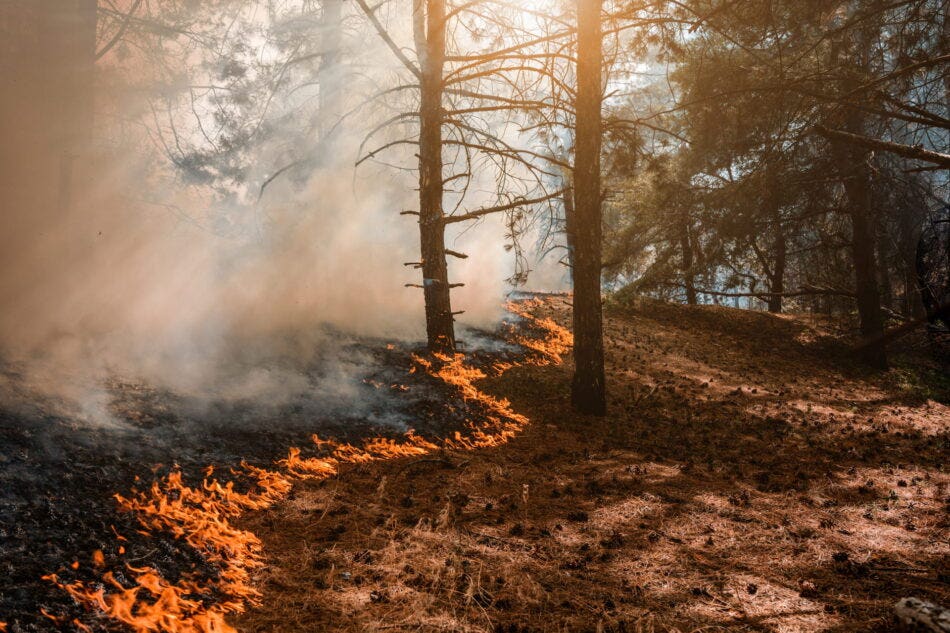Unfortunately, wildfires are an increasingly common reality for many campers. Whether they’re caused by a lightning strike or human activity, wildfires can start suddenly and spread quickly. They can also be extremely difficult to predict and get under control, especially if conditions are dry and the terrain is mountainous and remote. We’ll explain how to deal with a wildfire while RVing.
Don’t be the Cause of a Wildfire
It’s estimated that 88 per cent of wildfires were caused by human activity during the 2020 wildfire season in Alberta. In B.C., 59 per cent of wildfires in 2020 were human-caused. While this number is trending down, it’s important to practice exceptional fire safety to prevent starting a wildfire while you’re camping. You can do this by:
- Following provincial or regional fire bans (see Alberta’s fire bans here).
- Not parking your RV in tall grass (especially if it’s very dry).
- Ensuring nothing is dragging (such as a chain) from your RV.
- Following safe campfire practices, including:
- choosing your campfire site carefully (at least three metres from shrubs, trees and any structures, no overhanging trees, removing all twigs and leaves);
- using a fire pit or making a ring of rocks;
- having at least eight litres of water and a shovel or similar tool on hand to extinguish the fire (you should also have a serviced fire extinguisher in your RV);
- never leaving the campfire unattended; and,
- fully extinguishing the fire by pouring lots of water on the fire and around it, stirring, and dousing again (ashes should be cold to the touch and there should be no embers).
- If operating an off-highway vehicle (OHV), follow these practices:
- ensure your muffler and spark arrestor are working properly and remove any debris before you ride;
- if going through tall grass or muskeg, stop and clear debris from your vehicle regularly;
- stop frequently to check hot spots (exhaust and muffler, under the seat, wheel wells and manifold) and remove any debris;
- Carry fire suppression tools like a fire extinguisher or a small shovel and pail; and
- if any debris from your OHV is smouldering, ensure you put it out!
- Not setting off fireworks, firecrackers or exploding targets.
- If you smoke, disposing of your butts safely (pack them out if Crown land camping, too).
Report Any Wildfires You See
If you spot a wildfire, report it. If the fire is threatening people or buildings, call 911. Otherwise, you can report a forest fire at:
- In Alberta, call 403.310.FIRE (3473)
- In B.C., you can report a wildfire or behaviour that could lead to a wildfire by calling 1.800.663.5555.
Stay Aware of the Fire Risk
Every province offers a wildfire monitoring website—some even have apps:
- Alberta Wildfire Status Website or Mobile App
- Alberta Fire Bans
- B.C. Wildfire Dashboard
- B.C. Fire Bans
- Saskatchewan Wildfire Reports
- Saskatchewan Fire Bans
Check the fire report and if there are any fire bans or restrictions at your destination before you leave. If there’s an evacuation order or warning in the area you plan to camp in, you should not go.
Check the fire reports and weather daily (lightning is the second-leading cause for wildfires). If you can’t check with your phone, get a weather alert radio.
If there’s a high wildfire risk, it’s best to camp elsewhere or somewhere with multiple exit routes. You should also have signal mirrors or a personal locator beacon or a way of contacting help even if there’s no phone service.
What to Do If There’s a Wildfire Nearby
Smoke is generally the first indicator of a nearby wildfire. If you spot smoke:
- Report the fire—never attempt to fight a fire yourself.
- If you feel unsafe or are ordered to evacuate, leave the area.
- If you stay, monitor the situation and be prepared to evacuate on short notice.
Remember that wildfires are unpredictable and can move quickly. The smoke can also be harmful. We have an article with more information on dealing with wildfire smoke in an RV.
RV Insurance & Wildfires
RV insurance does cover damage to your RV caused by wildfires.
You should be properly insured before wildfire season, however, because we do not write new policies or amend coverage in an area where there is an active wildfire.
Talk to one of our RV insurance specialists to understand this coverage or to insure your RV for wildfire damage today.

